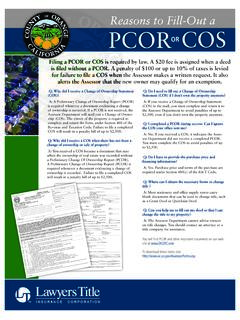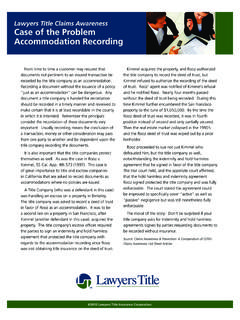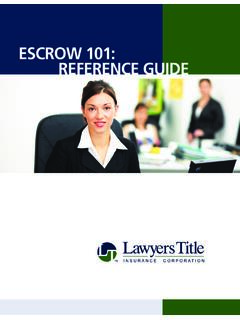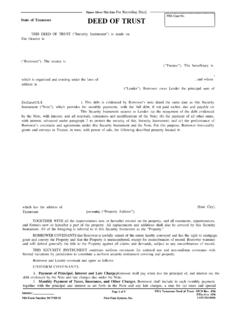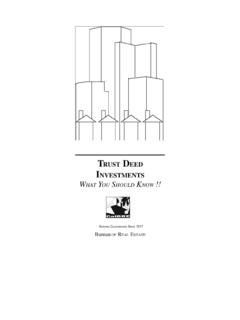Transcription of What Is An All Inclusive Trust Deed (AITD)?
1 All- Inclusive Trust deed An All Inclusive Trust deed (AITD) is a new deed of Trust that includes the balance due on the existing note plus new funds advanced; also known as a wrap-around MortgageA wrap-around mortgage, more-commonly known as a wrap , is a form of secondary financing for the purchase of real property. The seller extends to the buyer a junior mortgage which wraps around and exists in addition to any superior mortgages already secured by the property. Under a wrap, a seller accepts a secured promissory note, an AITD, from the buyer for the amount due on the underlying mortgage plus an amount up to the remaining purchase money new purchaser makes monthly payments to the seller, who is then responsible for making the payments to the underlying mortgagee(s). Should the new purchaser default on those payments, the seller then has the right of foreclosure to recapture the subject on Sale As title is actually transferred from seller to buyer, the chief danger of the wrap around mortgage is to the seller.
2 Most mortgages have a due on sale clause. This means if the house is sold, the entire mortgage balance is due. If the seller cannot pay that amount or borrow it and pay it, the lender could foreclose on the home. The due on sale clause is not always enforced, but sellers must be aware of Default The seller has also taken on all of the risk of a traditional lender in a wrap around mortgage. If the borrower doesn t pay, the seller bears all the costs associated with enforcing the loan or , if the borrower doesn t pay, the seller is then at risk of being unable to pay his mortgage and could face foreclosure. This can occur even though the borrower is causing the problem by not paying. The wrap around is a second mortgage and as such is in a second position for enforcement. If the seller cannot pay the first mortgage, even when it is the home buyers fault, the original mortgage lender has the first claim and can foreclose on the original home Default Risks of a wrap around mortgage are not limited to the seller.
3 The buyer faces default risk as well. As an example, if a buyer consistently makes monthly payments, but the seller is not then paying the first mortgage, the original mortgage lender can foreclose on the of a wrap-around mortgage secured by an AITD The seller, who has the original mortgage sells his home with the existing first mortgage in place and a second mortgage which he carries back from the buyer. The mortgage he takes from the buyer is for the amount of the first mortgage plus a negotiated amount less than or up to the sales price, minus any down payment and closing costs. The monthly payments are made by the buyer to the seller, who then continues to pay the first mortgage with the proceeds. When the buyer either sells or refinances the property, all mortgages are paid off in full, with the seller entitled to the difference in the payoff of the wrap and any underlying loan Is An All Inclusive Trust deed (AITD)?
4 2009 Lawyers Title Insurance Corporatio

